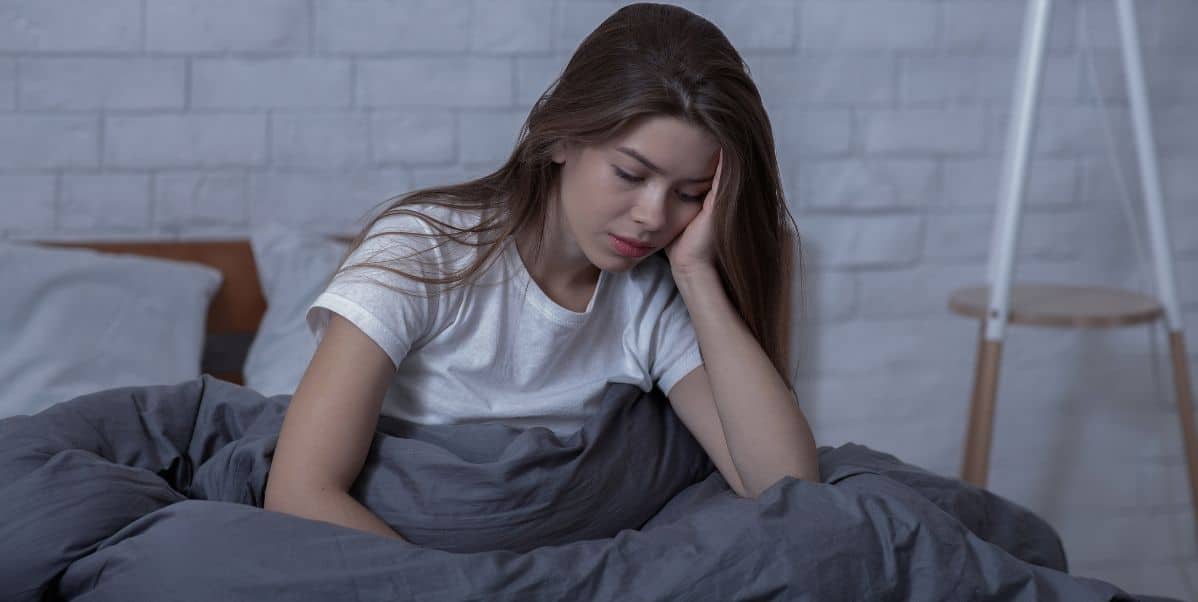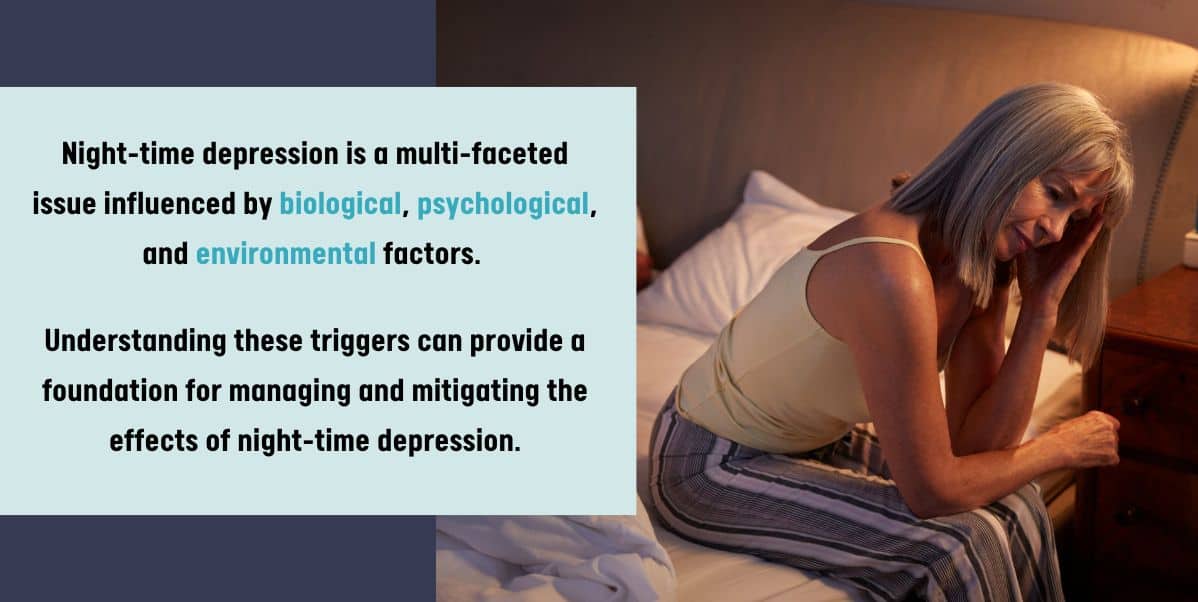
If you’ve ever felt more downcast as the sun sets, know that you’re not alone. Many of us experience a strange phenomenon where our spirits seem to dip with the daylight, causing an increase in depressive feelings as night approaches. This is often called “nighttime depression” or “nocturnal depression.” But why does this happen? Why do some of us feel more depressed at night?
In this blog post, we’ll delve into the reasons behind this intriguing pattern. We’ll explore the psychology of nighttime depression, discuss its connection to our body’s internal clock, and examine how factors like loneliness, overthinking, and lack of distractions can make these feelings more prominent as darkness falls.
By understanding the causes of nighttime depression, we can better manage it and seek effective medical or professional intervention. So, if you’ve been wondering, “Why do I get more depressed at night?” keep reading, as we shed light on this nocturnal adversary.
Depression Explained
Depression is a prevalent and serious medical illness that impacts the way you feel, think, and act. It’s characterized by persistent sadness or a lack of interest in once-used activities. The condition extends beyond normal feelings of sadness or low mood and can last for weeks or longer, significantly affecting one’s quality of life.
Depression manifests through symptoms such as persistent sadness, difficulty sleeping or oversleeping, loss of interest in activities once enjoyed, energy loss, feelings of worthlessness, and suicidal thoughts. While the exact cause of depression isn’t known, it’s believed to be a combination of genetic, biological, environmental, and psychological factors. It’s important to note that depression can affect anyone, regardless of age or background.
Depression can significantly impact daily life, interfering with your ability to work, study, eat, sleep, and enjoy life. The persistent feeling of sadness or disinterest can make even routine tasks seem overwhelming. It can also lead to physical health problems or cause difficulties in relationships due to social withdrawal. It’s crucial to seek professional help if you or someone you know is dealing with depression.
Nocturnal Depression: An Overview
Nocturnal depression is not a distinct subtype of depression but rather describes the exacerbation of depressive symptoms in the evening. It’s characterized by feelings of hopelessness and worthlessness, a persistently low mood, irritability, and loss of interest in hobbies or activities. Sleep issues, such as difficulty falling or staying asleep, are also common.
The science behind nocturnal depression is complex and multifaceted. One of the key factors is our body’s internal circadian rhythm. Some studies have found elevated nocturnal body temperatures in those with depression and changes in the circadian rhythm of cortisol, a stress hormone.
This could explain why depressive symptoms worsen at night. One research study found that insomnia, a disorder characterized by multiple nocturnal symptoms, is often associated with higher depressive signs.
Factors Contributing to Night-Time Depression
Night-time depression can be influenced by a multitude of factors, including:
- Circadian Rhythm Disruption: Our body’s internal clock, or circadian rhythm, regulates feelings of sleepiness and wakefulness over a 24-hour period. When this rhythm is disrupted, such as by staying up late, it can lead to mood disorders, including depression.
- Lack of Positive Distractions: During the day, work, social interactions, and other activities can keep depressive thoughts at bay. However, when these distractions are absent at night, feelings of loneliness and sadness may become more apparent and overwhelming.
- Sleep Disorders: Conditions like insomnia, where one has difficulty falling asleep or staying asleep, can also exacerbate depressive symptoms. This is partly due to the fact that lack of sleep can lead to physical fatigue, which in turn can lower your mood and increase feelings of sadness.
- Overthinking: The quiet and solitude of the night can often lead to a spiral of negative thoughts. Without daily tasks and interactions to occupy the mind, individuals may find themselves ruminating on negative experiences or worries, leading to increased feelings of depression.
- Prolonged use of smartphones, TV, or computer screens: The blue light emitted by phones, laptops, and televisions can suppress the production of melatonin, a hormone that regulates sleep-wake cycles. This can disrupt your sleep patterns and contribute to feelings of depression.

Coping Strategies for Nocturnal Depression
Managing nocturnal depression can be challenging, but various coping strategies can significantly help:
- Establishing a Routine: Keeping a consistent sleep schedule is crucial. Try sleeping and waking up at the same time every day. This helps regulate your body’s internal clock and could aid in reducing nighttime depression symptoms.
- Keeping a Sleep Diary: Documenting your sleep patterns and feelings each night and morning can provide valuable insights into what triggers your nocturnal depression. Over time, this can help you and your healthcare provider develop a personalized treatment plan.
- Creating a Restful Environment: Make your sleeping environment as comfortable as possible. This might mean investing in a quality mattress, keeping the room cool, and eliminating as much noise and light as possible.
- Maintaining a Healthy Lifestyle: Regular physical activity and a balanced diet can promote better sleep. Avoid alcohol and caffeine late into the day, particularly in the hours leading up to bedtime.
- Seeking Professional Help: If nocturnal depression continues to disrupt your life, consider seeking professional help. A mental health professional can provide treatments such as medications, TMS therapy and cognitive-behavioral therapy (CBT), all of which have been proven effective in treating depressive symptoms.
Find Relieve at My TMS
Don’t let nighttime depression rob you of your rest and peace. My TMS offers state-of-the-art, FDA-approved Transcranial Magnetic Stimulation (TMS) treatments designed to help manage and mitigate your depressive symptoms. Our team of experts is ready to guide you through your journey towards better mental health. Call us today at (877) 548-8081 to take the first step. If you prefer, you can also fill in this contact form to book an appointment. Make the decision today to reclaim your nights and your life from depression. We’re here to help every step of the way.


